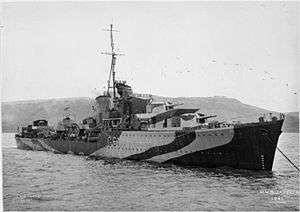HMS Javelin (F61)
 Javelin at anchor, 1941 | |
| History | |
|---|---|
| Name: | HMS Javelin |
| Builder: | John Brown and Company |
| Laid down: | 11 October 1937 |
| Launched: | 21 December 1938 |
| Commissioned: | 10 June 1939 |
| Identification: | Pennant number: F61 |
| Fate: | Sold for scrap, 11 June 1949 |
| General characteristics (as built) | |
| Class and type: | J-class destroyer |
| Displacement: | |
| Length: | 356 ft 6 in (108.66 m) o/a |
| Beam: | 35 ft 9 in (10.90 m) |
| Draught: | 12 ft 6 in (3.81 m) (deep) |
| Installed power: |
|
| Propulsion: | 2 × shafts; 2 × geared steam turbines |
| Speed: | 36 knots (67 km/h; 41 mph) |
| Range: | 5,500 nmi (10,200 km; 6,300 mi) at 15 knots (28 km/h; 17 mph) |
| Complement: | 183 (218 for flotilla leaders) |
| Sensors and processing systems: | ASDIC |
| Armament: |
|
HMS Javelin was a J-class destroyer of the Royal Navy laid down by John Brown and Company, Limited, at Clydebank in Scotland on 11 October 1937, launched on 21 December 1938, and commissioned on 10 June 1939 with the pennant number F61.
History
In May 1940, during Operation Dynamo, Javelin and other destroyers rescued survivors from the sinking of SS Abukir.[1][2]
At the end of November 1940 the 5th Destroyer Flotilla, consisting of HMS Jupiter, Javelin, Jackal, Jersey, and Kashmir, under Captain Lord Louis Mountbatten, was operating off Plymouth, England. The flotilla engaged the German destroyers Hans Lody, Richard Beitzen, and Karl Galster. Javelin was badly damaged by torpedo and artillery hits from the German destroyers and lost both her bow and her stern. Only 155 feet (47 m) of Javelin's original 353 ft (108 m) length remained afloat and she was towed back to harbour. Javelin was out of action for almost a year. Probably arising from this incident, Stoker First Class T Robson was killed and is interred at St Pol de Leon Cemetery, Brittany, France.
Javelin participated in the Operation Ironclad assault on Madagascar in May 1942.
She participated in the failed Operation Vigorous attempt to deliver a supply convoy to Malta, in June 1942. Javelin along with HMS Kelvin destroyed a flotilla of Italian small ships on the night of 19 January 1943.
Javelin's record was marred on 17 October 1945 whilst off Rhodes by an outbreak of indiscipline (a refusal to work by “Hostilities Only” ratings following resentment over a return to pre-war spit-and-polish): one leading rating was charged with mutiny, and several ratings were subsequently court-martialled, though sentences were reduced as the facts became known.[3]
Javelin was sold to the shipbreakers on 11 June 1949, and she was scrapped at Troon in Scotland.
See also
- Henry Leach (navigating officer during mutiny; more details at Leech article)
Notes
- ↑ Mason, Geoffrey B (2004). Smith, Gordon, ed. "HMS Grenade (H 86) – G-class Destroyer". Service Histories of Royal Navy Warships in World War 2. Retrieved 17 December 2013.
- ↑ Mason, Geoffrey B (2004). Smith, Gordon, ed. "HMS Javelin (F 61) – J-class Destroyer". Service Histories of Royal Navy Warships in World War 2. Retrieved 17 December 2013.
- ↑ Javelin mutiny at hms-javelin.co.uk
References
- Colledge, J. J.; Warlow, Ben (2006) [1969]. Ships of the Royal Navy: The Complete Record of all Fighting Ships of the Royal Navy (Rev. ed.). London: Chatham Publishing. ISBN 978-1-86176-281-8. OCLC 67375475.
- English, John (2001). Afridi to Nizam: British Fleet Destroyers 1937–43. Gravesend, Kent: World Ship Society. ISBN 0-905617-64-9.
- Friedman, Norman (2006). British Destroyers & Frigates: The Second World War and After. Annapolis, Maryland: Naval Institute Press. ISBN 1-86176-137-6.
- Hodges, Peter; Friedman, Norman (1979). Destroyer Weapons of World War 2. Greenwich: Conway Maritime Press. ISBN 978-0-85177-137-3.
- Langtree, Charles (2002). The Kelly's: British J, K, and N Class Destroyers of World War II. Annapolis, Maryland: Naval Institute Press. ISBN 1-55750-422-9.
- Lenton, H. T. (1998). British & Empire Warships of the Second World War. Annapolis, Maryland: Naval Institute Press. ISBN 1-55750-048-7.
- March, Edgar J. (1966). British Destroyers: A History of Development, 1892–1953; Drawn by Admiralty Permission From Official Records & Returns, Ships' Covers & Building Plans. London: Seeley Service. OCLC 164893555.
- Rohwer, Jürgen (2005). Chronology of the War at Sea 1939–1945: The Naval History of World War Two (Third Revised ed.). Annapolis, Maryland: Naval Institute Press. ISBN 1-59114-119-2.
- Whitley, M. J. (2000). Destroyers of World War Two: An Illustrated Encyclopedia. London: Cassell & Co. ISBN 1-85409-521-8.
- Winser, John de S. (1999). B.E.F. Ships Before, At and After Dunkirk. Gravesend: World Ship Society. ISBN 0-905617-91-6.
External links
| Wikimedia Commons has media related to HMS Javelin (F61). |